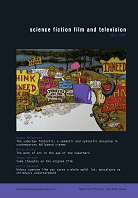
Science Fiction Film and Television
Scope & Guideline
Illuminating the Intersection of Sci-Fi and Visual Arts
Introduction
Aims and Scopes
- Interdisciplinary Analysis:
The journal encourages interdisciplinary perspectives, drawing from cultural studies, gender studies, queer theory, and postcolonial studies to analyze science fiction narratives. - Critical Engagement with Popular Culture:
It focuses on critical engagement with popular science fiction films and television series, analyzing their cultural significance and societal implications. - Exploration of Identity and Representation:
The journal addresses themes of identity, including race, gender, and sexuality, examining how science fiction reflects and shapes societal norms and values. - Theoretical Frameworks:
Utilizing various theoretical frameworks, the journal investigates the philosophical and ethical questions posed by science fiction, particularly in relation to technology and humanity. - Environmental and Sociopolitical Concerns:
It explores the relationship between science fiction narratives and contemporary environmental issues, as well as sociopolitical themes such as colonization, dystopia, and utopia.
Trending and Emerging
- Intersectionality in Science Fiction:
There is a growing emphasis on intersectionality, particularly how race, gender, and sexuality intersect within science fiction narratives, showcasing a more nuanced understanding of identity. - Environmental Narratives:
Emerging themes around environmentalism and the Anthropocene highlight the relationship between science fiction and ecological crises, reflecting a heightened awareness of climate change in contemporary discourse. - Queer and Feminist Perspectives:
The journal increasingly features queer and feminist analyses of science fiction, indicating a trend toward exploring alternative masculinities, sexual identities, and feminist critiques within the genre. - Transmedia and Worldbuilding:
There is a notable trend in examining transmedia storytelling and worldbuilding, particularly how narratives expand across different media formats, reflecting the complexities of modern storytelling. - Global and Decolonial Perspectives:
Emerging scholarship is focusing on global and decolonial approaches to science fiction, exploring how narratives from diverse cultural contexts challenge Western-centric views and offer alternative futures.
Declining or Waning
- Traditional Sci-Fi Tropes:
There appears to be a waning interest in traditional science fiction tropes, such as space exploration and alien encounters, as the discourse shifts toward more contemporary and socially relevant themes. - Classic Film Analysis:
Analysis of classic science fiction films seems to be less prevalent, with fewer papers dedicated to canonical texts, as newer works and their cultural implications take precedence. - Nostalgia in Sci-Fi:
Themes centered around nostalgia in science fiction, particularly related to retro or revival genres, have diminished, indicating a move towards forward-looking narratives rather than reflective ones.
Similar Journals
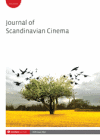
Journal of Scandinavian Cinema
Advancing Interdisciplinary Insights in Film StudiesThe Journal of Scandinavian Cinema, established in 2014 and published by INTELLECT LTD, serves as a premier platform dedicated to the interdisciplinary field of film studies with a specific focus on Scandinavian cinema. With an impressive Q2 category ranking in Visual Arts and Performing Arts for 2023, and a Scopus rank placing it in the top 62nd percentile of its category, this journal is instrumental in advancing scholarly dialogue within the arts community. The journal strives to explore and critique cinematic expressions from the Nordic countries, contributing to a nuanced understanding of cultural narratives and filmic innovations. Committed to fostering accessibility and engagement, it caters to a diverse audience including researchers, professionals, and students keen to delve into the artistic, cultural, and political dimensions of cinema. The Journal of Scandinavian Cinema is essential for anyone interested in the evolution and impact of film in the Scandinavian context, promising rich insights and a robust collection of scholarly articles.
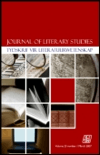
Journal of Literary Studies
Exploring the depths of literature and theory.Journal of Literary Studies, published by UNISA PRESS, is a premier open access journal dedicated to advancing the field of literature and literary theory. With its ISSN 0256-4718 and E-ISSN 1753-5387, the journal has established itself as a leading platform for innovative research since its inception in 1985, with a notable convergence period running through to 2024. Recognized in the Q1 quartile of literature and literary theory, the journal ranks impressively at #236 out of 1106 in its category according to Scopus, highlighting its impact in the arts and humanities with a percentile rank of 78th. The journal's open access model, adopted in 2022, reflects its commitment to accessibility and dissemination of knowledge globally, making it an essential resource for researchers, academics, and students alike. With an editorial focus on interdisciplinary approaches and contemporary critical discourse, the Journal of Literary Studies serves as a vital vessel for the exchange of ideas and scholarly dialogue in the intricate landscape of literary studies.
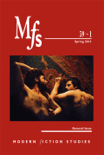
MFS-Modern Fiction Studies
Exploring the Depths of Contemporary NarrativesMFS-Modern Fiction Studies is a premier journal in the field of literature and literary theory, published by Johns Hopkins University Press. With an impressive impact factor and a 2023 classification in Q1, this journal stands out as a vital resource for scholars, researchers, and practitioners interested in contemporary fiction analysis and criticism. The journal aims to foster innovative scholarship, enhance discussions around literary trends, and explore the intricacies of modern narrative forms. Notably, it ranks #119 among 1,106 in the Scopus Arts and Humanities category, placing it within the top 89th percentile. Published four times a year, MFS is committed to making significant contributions to the understanding of modern fiction, making it a must-read for anyone vested in the evolution of literature. Access options are available through institutional subscriptions, ensuring that readers can engage with cutting-edge research and discourse in the literary community.
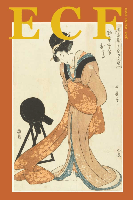
Eighteenth-Century Fiction
Illuminating the Transformative Power of Eighteenth-Century TextsEighteenth-Century Fiction is a premier academic journal dedicated to advancing the study of literature from the eighteenth century, publishing innovative research that contributes to understanding the cultural and historical contexts of this dynamic period. Published by University of Toronto Press, Inc., this journal boasts an impressive Q1 categorization in the field of Literature and Literary Theory, reflecting its significant impact on discourse among scholars. Since its inception in 2002, the journal has provided a platform for interdisciplinary exploration and critical analysis, appealing to researchers, professionals, and students alike. With an ongoing commitment to quality and scholarly excellence, Eighteenth-Century Fiction serves as an essential resource for those seeking to delve into the literary innovations and societal transformations of the eighteenth century. Access to its rich collection of articles ensures that the academic community remains engaged with emerging trends and pivotal research in this vital area of study.
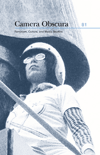
CAMERA OBSCURA
Challenging Norms Through the Lens of Gender StudiesCAMERA OBSCURA, an esteemed journal published by DUKE UNIVERSITY PRESS, serves as a vital platform at the intersection of Visual Arts and Gender Studies. With its ISSN 0270-5346 and E-ISSN 1529-1510, this journal has been an influential contributor to critical discussions in cultural theory and visual culture from 2002 to 2024. Notably categorized in the Q4 quartile for Gender Studies and Q2 for Visual Arts and Performing Arts in 2023, CAMERA OBSCURA boasts a Scopus rank that reflects its growing impact within the academic community. Although currently not offered as an open-access publication, its rigorous peer-reviewed content remains crucial for researchers, professionals, and students alike, facilitating a deeper understanding of how visual representation shapes and is shaped by societal constructs. Set in the heart of the United States, the journal's commitment to exploring the complexities of gendered visuality emphasizes its importance within contemporary scholarship in these vibrant fields.

Critical Studies in Television
Dissecting the Art and Impact of TelevisionCritical Studies in Television is a leading academic journal published by SAGE Publications Ltd, dedicated to exploring the intricate dimensions of television within the fields of Communication and Cultural Studies. Since its inception, this journal has become an essential resource for researchers, professionals, and students alike, particularly as it navigates the evolving landscape of television studies from 2014 to 2024. With an impressive impact factor, the journal achieved notable rankings in 2023: it is positioned in the Q2 quartile for Communications and the Q1 quartile for Cultural Studies. Recognized by Scopus with a rank of #160 in Cultural Studies and #193 in Communication, it reflects its growing influence and relevance in these academic arenas. While currently not available through an Open Access model, readers are encouraged to engage with its diverse and critical contributions that foster a deep understanding of television’s role in contemporary culture.
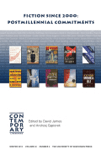
CONTEMPORARY LITERATURE
Connecting Scholars to the Pulse of Modern LiteratureCONTEMPORARY LITERATURE, published by the prestigious University of Wisconsin Press, stands as a vital platform for scholars and enthusiasts within the field of literary studies. With its ISSN 0010-7484 and E-ISSN 1548-9949, this journal has established itself as a respected source of innovative research across various dimensions of literature and literary theory. Holding an impressive Q2 ranking in the 2023 category of Arts and Humanities, this publication not only reflects current trends but also fosters critical discourse around contemporary authors and movements from 2002 to 2024. Engaging articles submitted to CONTEMPORARY LITERATURE enhance our understanding of narrative forms and their cultural relevance, making it an essential read for academics, professionals, and students alike. While the journal is not open access, its impact within the literary community continues to grow, as evidenced by its Scopus rank of #616 out of 1106. For those dedicated to exploring the evolving landscape of literature, CONTEMPORARY LITERATURE is a must-have in one's scholarly toolkit.
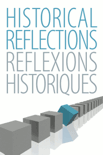
HISTORICAL REFLECTIONS-REFLEXIONS HISTORIQUES
Uncovering the Layers of Time Through Thoughtful ReflectionHistorical Reflections / Reflexions Historiques is a pivotal academic journal in the field of history, published by Berghahn Journals. Established to provide a platform for innovative historical scholarship, the journal offers a unique blend of theoretical discussions and empirical studies that critically engage with new interpretations and methodologies. With a robust reputation evidenced by its category ranking in the 2023 Q3 History quartile and a Scopus ranking of #1164 in the Arts and Humanities, Historical Reflections serves as an essential resource for researchers, professionals, and students alike. Although the journal is not available through open access, it contributes significantly to historical discourse through its diverse range of articles, fostering a deeper understanding of past events and their implications for the present and future. As it continues to evolve from its inception in 1977 to the present day, Historical Reflections remains committed to advancing the field through rigorous analysis and scholarly debate.
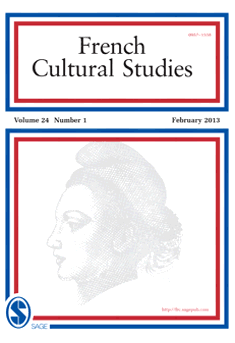
French Cultural Studies
Contributing to the Global Discourse on French IdentityFrench Cultural Studies, published by SAGE Publications Inc, is a leading journal in the domains of Cultural Studies and History. With its ISSN 0957-1558 and E-ISSN 1740-2352, this esteemed journal has made significant contributions to the understanding of French culture, literature, and society since its inception in 1990. Notably ranked in the Q2 category for Cultural Studies and Q1 category for History in 2023, it stands out with impressive Scopus rankings, placing 447th in History and 482nd in Cultural Studies. The journal aims to facilitate a nuanced discourse around French cultural phenomena, offering researchers, professionals, and students a platform for high-quality scholarly work. Although it does not operate under an Open Access model, its rigorous peer-review process ensures the publication of impactful articles that advance academic inquiry and foster collaborative dialogue in the field. Adhering to the mission of promoting interdisciplinary research, French Cultural Studies is a vital resource for anyone interested in exploring the complexities of French cultural identity and its global implications.
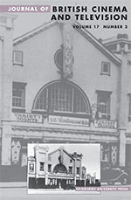
Journal of British Cinema and Television
Decoding the Dynamics of Cinema and TelevisionJournal of British Cinema and Television, published by Edinburgh University Press, is a leading academic journal that explores the dynamic interplay between British cinema and television within the context of cultural studies. With an ISSN of 1743-4521 and E-ISSN of 1755-1714, this journal provides a platform for scholarly discourse, enabling researchers, professionals, and students to engage with critical analyses of screen media and its socio-political impact. As a Q3 journal in Communication and a Q1 journal in Visual Arts and Performing Arts for 2023, it occupies an influential position, particularly in the Arts and Humanities, where it ranks in the 90th percentile. The journal's scope encompasses a wide range of topics, from historical perspectives to contemporary practices in British visual culture, making it essential reading for anyone interested in the evolution and significance of screen studies in the UK. While it is not an open-access publication, the rigorous peer-review process ensures high academic standards and contributes to its esteemed reputation in the field. As it continues to converge from 2004 to 2024, the Journal of British Cinema and Television remains a vital resource for those seeking to deepen their understanding of British media and its global resonance.